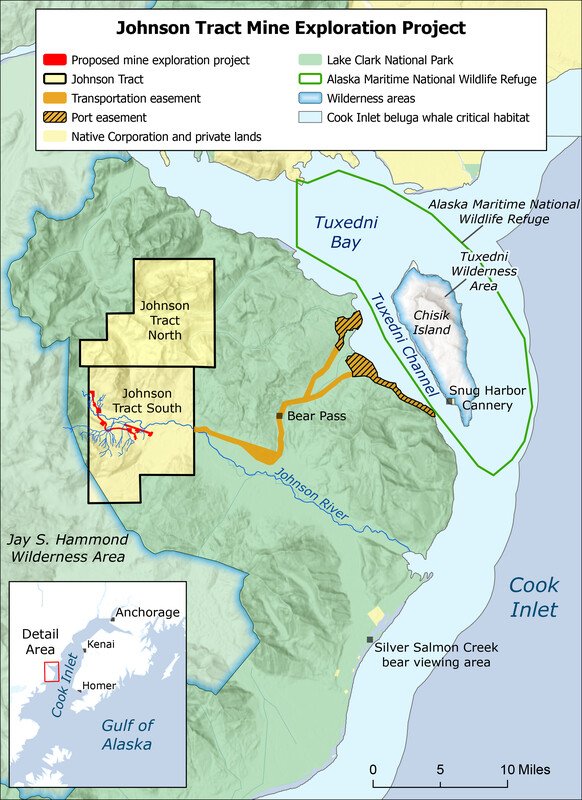For Immediate Release, May 20, 2025
| Contact: |
Satchel Pondolfino, Cook Inletkeeper, Lisa Wade, Chickaloon Village Traditional Council, Marlee Goska, Center for Biological Diversity, |
Lawsuit Aims to Protect Cook Inlet, Belugas from Water Pollution, Noise
Gold Mining Exploration Threatens Lake Clark National Park, Beluga Critical Habitat
ANCHORAGE, Alaska— Several groups and an Alaska resident filed suit today to protect endangered Cook Inlet beluga whales and the Johnson River, which flows through Lake Clark National Park before entering Cook Inlet, or Tikahtnu in the Dene language.
The lawsuit challenges a U.S. Army Corps of Engineers’ Clean Water Act permit for the Johnson Tract gold mining exploration project at the headwaters of the Johnson River, on private lands surrounded by the park.
“The Army Corps’ failure to assess the risk of acid mine drainage or consider impacts to the critically endangered Cook Inlet beluga whale is a grave lapse in environmental oversight,” said Satchel Pondolfino, clean water lead with Cook Inletkeeper. “The Johnson River supports an ecosystem rich with salmon, herring, wolves, wolverines and iconic Alaskan brown bears, which are becoming scarcer as Tikahtnu becomes more industrialized. What’s at risk is one of the most ecologically rich corners of Tikahtnu and the Army Corps has a duty to carefully scrutinize all implications of this permit.”
Today’s lawsuit, filed in U.S. District Court in Anchorage, says the Army Corps violated the Clean Water Act, the Endangered Species Act and the National Environmental Policy Act in granting the permit. The Army Corps did not consult with NOAA Fisheries to ensure endangered Cook Inlet belugas are protected from harms caused by the project. The Army Corps also failed to take a hard look at the project’s potential to cause acid mine drainage and leach contaminants into the Johnson River.
The Army Corps issued the permit to mining company Contango Ore to build a haul road through the upper Johnson River watershed. The road would provide access for excavating a tunnel to explore for potential gold deposits. A technical report prepared by the permit applicant shows that the Johnson Tract contains acid generating rock. Tunnel excavation could therefore lead to acid mine drainage and contaminant leaching, which is common when gold and other metals are mined. The Johnson River crosses into Lake Clark National Park just a few miles downstream from the planned mining activities.
The Johnson River’s clean, glacially fed waters support a robust brown bear population, salmon, wolves, wolverines and many other animals. Abundant razor clams are found at the river’s mouth, where it empties into Cook Inlet just 13 miles from where the exploratory mining is proposed.
The permit also allows the company to expand an airstrip to accommodate large, noisy cargo aircraft. The most direct flight route would pass over nearby Tuxedni Bay, within the Alaska Maritime National Wildlife Refuge. The bay, an essential quiet refuge, is the only known winter foraging ground of the critically endangered Cook Inlet beluga.
Belugas are incredibly sensitive to noise pollution, including from low-flying airplanes and helicopters. Anthropogenic noise is a primary threat to the whale’s survival and recovery, as are water pollution and lack of food. Cook Inlet belugas used to number around 1,300 whales but today the population hovers around 331 and is at risk of extinction.
Contango Ore’s mining exploration project on the Johnson Tract inholding, which is owned by Cook Inlet Region, Inc., an Alaska Native corporation, could begin at any time. This project is part of the company’s efforts to develop a gold mine at the Johnson Tract.
“Developing a gold mine here would be environmentally catastrophic to the entire Cook Inlet ecosystem, including for endangered Cook Inlet beluga whales,” said Traditional Chief Gary Harrison of Chickaloon Village Traditional Council. “Acid mine drainage, metal leaching and gold mining toxics would devastate these waters, which support humans and the healthy foods necessary for our survival, including salmon, halibut and razor clams. The short-term economic gains of a gold mine are unconscionable and incompatible with Alaskans’ needs into the future. You can’t eat gold.”
“It’s outrageous that the Army Corps signed off on this disruptive, destructive project without looking at how it could harm belugas and other wildlife,” said Marlee Goska, Alaska staff attorney at the Center for Biological Diversity. “If these plans move forward, the Johnson River, the Cook Inlet and the animals who rely on clean water will be significantly imperiled. With loud aircraft flying overhead, Tuxedni Bay will no longer be the quiet refuge that endangered Cook Inlet belugas need now more than ever. The Army Corps should suspend the permit and look closely at the damage this project could cause.”
The coalition is represented by the Center for Biological Diversity and Roger Flynn of the Western Mining Action Project.

Cook Inletkeeper is a community-based non-profit organization that advocates for the public interest in maintaining clean water and lands for all, protecting Alaska’s Cook Inlet | Tikahtnu watershed and the life it sustains.
Chickaloon Village Traditional Council is the governing body of the federally recognized Chickaloon Native Village, a distinct, independent Indigenous community whose citizens and ancestors have protected and stewarded the lands and waters of the Tikahtnu (Cook Inlet) region for many thousands of years.
The Center for Biological Diversity is a national, nonprofit conservation organization with more than 1.8 million members and online activists dedicated to the protection of endangered species and wild places.

